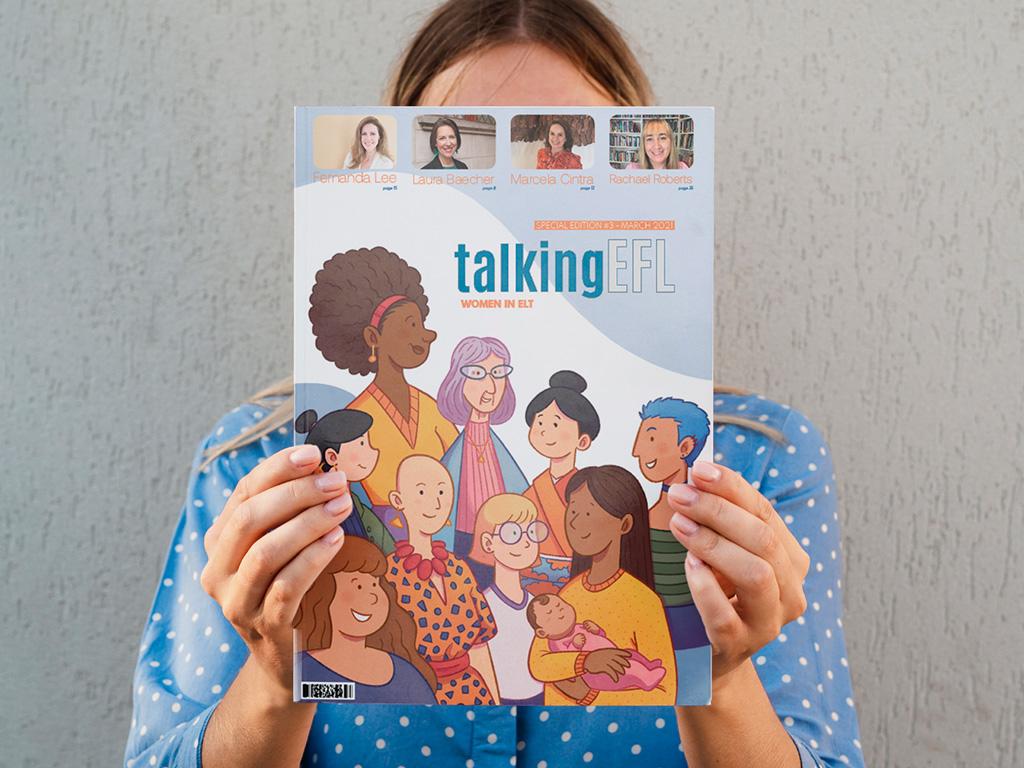Article by Fernanda Lee, Talking EFL, Special Edition 3, March 2021, page 15
Leadership is often associated with a person at the top of the pyramid. But for me, leadership is about how I lead my life and how I can be a positive influence in a collective effort. It is common to underestimate the power of your own leadership, but to be a leader is to have influence over others, independently of your hierarchical position. Here are three questions that helped me tap into my power, and maybe they can help you, too.
How can I serve?
As a school counselor I witnessed first-hand the various challenges and needs of both students and teachers. With technology taking on ever-greater importance in our schools and society, the craving for human connection has been made explicit. As I become aware of the psychological impact of high workload, depression, anxiety, and the quest to always be at peak performance output I can serve as a leader by building connections with my students (e.g., fun warm-ups in the beginning of a session and leading classroom meetings to address concerns), opening space for dialogue with families (e.g., offering regular workshops for parents to learn about parenting tools), and adding practical tools for teachers (e.g., problem solving and listening skills).
What is the shared vision?
As you collaborate online and in-person, you send and receive a great volume of information through e-mails, texts, and meetings. Each collaborator is moving so fast that you often forget to ask: Where are you going? A shared vision is the destination of your collective journey. Is this destination defined or agreed somewhere? Have you involved your students in the shared vision of today’s lesson? Have you discussed the shared vision with staff in your school? Have you talked about what you want with your family? A shared vision includes what you do, how you do it, and why you do it. Here is my business shared vision: “We believe that through education we can cultivate peace and connection in homes, schools, and organizations. We do this through experiential activities, inviting parents, students, teachers, and collaborators to sit in a circle and reflect on different perspectives.” Now, it’s your turn!
Why belonging and significance?
Because every human being has these two basic needs: to feel that they both belong in their social group and can somehow contribute to the common good. At one point in your life you have felt hurt, left out, or awkward in a social situation. When you feel that you belong in the family or workplace, you show the best versions of yourself. You are kind, efficient, and patient. On the other hand, when you feel as if you don’t belong, it hurts like a physical pain, which can lead you to lie, cheat, withhold information, or simply refuse to participate. Authentic leaders are aware of the triggers that make them feel as if they don’t belong or contribute. Then, they learn to ask questions that invite a dialogue: “I’m curious about…”, “Tell me more about…”, “What problem are your trying to solve?”, “Tell me why this doesn’t work for you…”, ”I’m working from this assumption. What is yours?”
I have spent the past 15 years dedicating time and energy to understanding and practicing one passion in my life: relationships. I have shared what I have learned during my journey as I became a master trainer in Positive Discipline, which has given me opportunities to travel to multiple countries and certify thousands of educators (regardless of whether they have their own children), because what Positive Discipline focuses on is the creation of safe spaces to build respectful relationships in any context: parenting, classroom, workplace, early childhood, and couples. Turn mistakes into opportunities to grow. Discover who you are becoming in the context of relationships.
Whether you are a solo mother raising children, a teacher at a school, or collaborator in a company, you are leading all the time, and there are respectful ways to live and work that can bring out the best leader in you.




